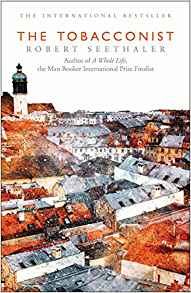The Tobacconist
When Franz Huchel travels from his serene mountain village to troubled, turbulent Vienna in 1937, it is a journey into the heart of darkness. For this is the year before Hitler’s annexation of Austria, and life in his uncle’s tobacconist shop, where he works as a clerk, is about to change. The shop serves the neighborhood of middle-class residents, among them Sigmund Freud, whom—with the aid of the professor’s favorite cigars—Franz befriends when he falls in lust with a Bohemian girl. But the young man is not allowed to take his mentor’s advice for long; all too soon, his uncle is attacked for catering to Jewish customers, and his shop vandalized. When he dies in custody at Gestapo headquarters, his nephew stages a series of protests that put him in peril. In the meantime, Freud and his family are preparing to leave the country.
Robert Seethaler’s The Tobacconist is a tender coming-of-age novel set at a time when Vienna’s moral and artistic light was about to be extinguished, and his descriptions of a city on the brink of destruction are vibrant and unforgettable. The depictions are similarly fascinating when Franz’s imagination flashes back to his boyhood home, a vanishing arcadia, which is being invaded by Nazism and its attendant horrors—as his mother’s letters attest eloquently. How can a sensitive, young man survive this nightmare without the consolations of love? Franz walks the streets of Vienna in search of the elusive Anezka, but when he finds her, tragedy and suffering ensues. Desire and poetry, along with history and drama, are the driving forces of this narrative, which describes Franz’s childhood and lost innocence in cinematic clarity. Watch out for a pair of billowing trousers.










